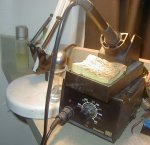- Joined
- Nov 6, 2008
- Messages
- 866
- Points
- 18
Lol ok, well where would i find it? my electronics and hobby stores dont have the thin stuff.Hemlock Mike said:Try to find .022" dia solder for most work. I reserve the .010" stuff for SMT jobs. Do not use acid core plumbers solder.
Mike




